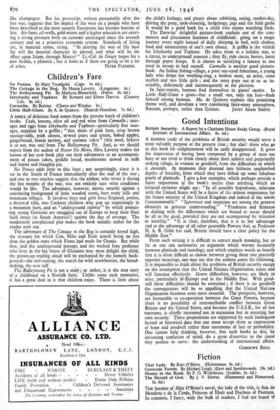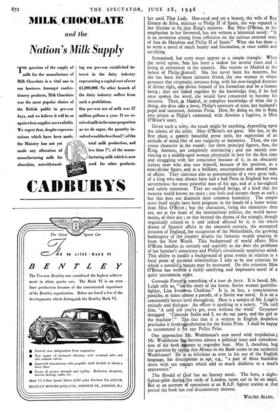Fiction
That Lady. By Kate O'Brien. (Heinemann. 9s. 6d.)
THE heroine of Miss O'Brien's novel, the lady of the title, is Ana de Mendoza y de la Cerda, Princess of Eboli and Duchess of Pastrana. In common, I fancy, with the bulk of readers, I had not heard of her until That Lady: One-eyed and yet a beauty, the wife of Ruy Gomez de Silva, minister to Philip II of Spain, she was reputed in her lifetime to be,, that King's mistress. But Miss O'Brien, as she emphasises in her foreword, has not written a historical novel: "It is an invention arising from reflection on the curious external story of Ana de Mendoza and Philip II of Spain." What she has done is to write a novel of much beauty and fascination, at once subtle and satisfying.
Synopsised, her- story must appear as a simple triangle. When the novel opens, Ana has been a widow for several years and is living in retirement in the country. She returns to Madrid at the behest of Philip4imself. She has _never been his mistress, but she has been his ,most intimate friend, the one woman in whose presence that enigmatic, tortuous king, with his new-fangled doctrine of divine right, can divest himself of his formalism. and be a human being ; they are linked together by the knowledge that, if he had once spoken the word, she would have consented to become his mistress. Then, in Madrid, in complete knowledge of what she is doing, she does take a lover, Philip's secretary of state, her husband's pupil and successor; Antonio Perez. How,-by doing so, she is flung into prison at Philip's command, with Antonio a fugitive, is Miss O'Brien't story. . .
Given such a story, the result might be anything, depending upon the talents of the teller. Miss O'Brien's are great. She has, in the first place, a gravely beautiful prose style, the expression of an attitude of mind fe of any vulgarity or meanness. Then, she can create character in the round : her three principal figures;Ana, the King, Antonio, are completely convincing ; and not merely con- vincing as a middle-aged woman physically in love for the first time and struggling with her conscience because of it, as an obscurely jealous man who also sees himself, because of his position, as a semi-divine figure, and as a brilliant, unscrupulous and amoral man of affairs. They convince also as presentations of a very great lady, of a king who may always have had a bad Press in England but was nevertheless the most powerful man of his age, and of a far-sighted and subtle statesman. They are exalted beings, of a kind that the western world knows no more ; one feels and accepts them as such ;. but this does not diminish their common humanity. The simple story itself might have been poignant in the hands 'of a lesser writer. than Miss O'Brien ; but the characters, being the characters they are, are at the heart of the international politics, the world move- ments, of their day ; so that beyond the drama of the triangle, though organically related to it and indeed affected by it, is the whole drama of Spanish affairs in the sixteenth century, the attempted, invasion of England, the occupation of the Netherlands, the growing bankruptcy of the country despite the fantastic wealth pouring in from the New World. This background of world affairs Miss O'Brien handles as. serenely and superbly as she does the problems of her heroine's conscience and Philip's circuitously suspicious mind. This ability to handle a background of great events in relation to a focal point of personal relationships I take to be one criterion by which a novelist ttature may be measured. On this criterion Miss O'Brien has written a richly satisfying and impressive novel of a quite uncommon order.
Comrade Forest*k something of a tour de force. It is based, Mr. Leigh tells us, " m*the story of the -heroic Soviet woman guerrilla- fighter Liza IvonOvna Chaikina." It is, in fact, a conscientious pastiche, at times almost a parody, of a Soviet war novel. It is on a consistently heroic level throughout. Here is a sample of Mr. Leigh's attitude and dialogue. An officer is speaking to a sentry. "He told him, ' A cold job you've got, even without the wind.' Gryaznov shrugged. ' Comrade Stalin and I, we do our parts, and the girl at * the machine '." e fact that it is written in English doubtless precludes it front sideration for the Stalin Prize. I shall be happy to recommend it or any Pollitt Prize.
One approaches Mr. Wodehouse's new novel with trepidation Mr. WodehouseVcome almost a pcilitical issue and considera- tion of his book ears to engender heat. May I, therefore, beg the question by saying that Money in the Bank seems to me authentic Wodehouse? He it as felicitous as ever in his use of the English language, his descriptions as apt, e.g., " a pair of those buckskin shoes with tan to caps which add so much diablerie to a man's appearance." The Herald of pod has no literary merit. The hero, a night- fighter-pilot durineshe raids of London, turns out to be an angeL But as an account of operations at an R:A.F. fighter station at that period the book has real documentary interest.
WALTER ALLEN.































 Previous page
Previous page